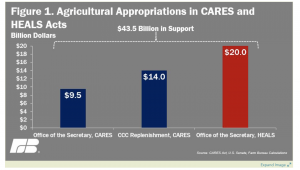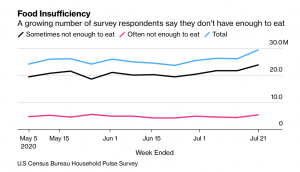Bloomberg's Mike Dorning reported on Wednesday that, "The Biden administration announced $12 billion in new farm aid, and said it will seek to expand Covid assistance to producers that weren’t…
Senate Releases Draft COVID Relief Measure (HEALS Act), a Follow-Up to CARES Act, but Different From House Passed HEROES Act
Washington Post writers Erica Werner, Jeff Stein and Seung Min Kim reported earlier this week that, “A fraught showdown over the next coronavirus relief bill got underway Monday as Senate Republicans unveiled a $1 trillion package [the Health, Economic Assistance, Liability Protection and Schools Act, or HEALS Act], and congressional Democratic leaders met with top White House officials.
The Post article noted that, “The prospects for a bipartisan deal remained far from certain as House Speaker Nancy Pelosi (D-Calif.) and Senate Minority Leader Charles E. Schumer (D-N.Y.) met late Monday with Treasury Secretary Steven Mnuchin and White House Chief of Staff Mark Meadows to begin formal negotiations.”
Los Angeles Times writer Jennifer Haberkorn explained this week that, “The release of the [GOP] plan marked the start of negotiations that will involve House Democrats, who passed their own, more generous relief bill in the House in May [the HEROES Act] that includes $1,200 checks and an extension of the $600 unemployment benefit.”
With respect to the legislative calendar, Bloomberg writers Erik Wasson, Laura Litvan, and Laura Davison pointed out this week that, “Time is running out, with Congress looking to recess for a month starting in early August.”
More narrowly regarding agriculture, and the Senate GOP proposal, the Bloomberg article noted that,
The Republican proposal would provide $20 billion in aid for agriculture, delegating broad discretion on spending to Agriculture Secretary Sonny Perdue. The legislation would allow Perdue to use the aid to compensate livestock producers for losses from killing animals that couldn’t be sent to slaughterhouses because of virus-related shutdowns and slowdowns.
This legislation will help ensure we can mitigate the long-term impacts of COVID-19 on farm country & I am hopeful that we can pass this relief for producers in a timely way. https://t.co/DjGnyLgk3L
— Senator John Hoeven (@SenJohnHoeven) July 27, 2020
A Market Intel update this week from the American Farm Bureau Federation (“What’s in the HEALS Act for Agriculture?“) noted that the HEROES Act is “follow-up legislation to the Coronavirus Aid, Relief, and Economic Security Act [CARES Act] passed in March.”
Outlined the agriculture assistance we secured in the HEALS Act on the Senate floor today. We must act in a timely manner, and I call upon my colleagues to provide this much-needed relief for farm country & rural America. pic.twitter.com/RCR6tB3WEz
— Senator John Hoeven (@SenJohnHoeven) July 29, 2020
The Farm Bureau update stated that, “The CARES Act appropriated $9.5 billion to the office of the Agriculture secretary and replenished the Commodity Credit Corporation by $14 billion. The HEALS Act continues efforts to support agricultural producers by appropriating $20 billion to the office of the agriculture secretary to:
“‘prevent, prepare for, and respond to coronavirus by providing support for agricultural producers, growers, and processors impacted by coronavirus, including producers, growers, and processors of specialty crops, non-specialty crops, dairy, livestock and poultry, including livestock and poultry depopulated due to insufficient processing access and growers who produce livestock or poultry under a contract for another entity.’
“Combined, the CARES and HEALS acts would provide $43.5 billion to USDA to craft agricultural assistance packages to offset the financial losses associated with COVID-19.”

The Farm Bureau report explained that,
While many of the agricultural-related provisions are similar, the provisions of the HEALS Act provide USDA much more flexibility to craft crucial assistance for producers as well as processors of agricultural products. The next step in this process is to bridge the divide between the HEALS and HEROES acts – an effort that is likely to extend into August.
A DTN article on Wednesday quoted Rob Larew, president of the National Farmers Union, as saying: “Family farmers and ranchers have been under immense financial pressure for many years, and the market disruptions and uncertainty wreaked by the pandemic have just compounded their stress. It’s clear that farmers require additional support to stay solvent, and the HEALS Act is an important step toward providing that support. To ensure that the funding earmarked by the bill is fairly and equitably distributed, we urge congressional oversight of and greater transparency about how and to whom assistance is offered.”
Meanwhile, Reuters writer Stephanie Kelly reported this week that, “The U.S. biofuel industry may have to depend on Agriculture Secretary Sonny Perdue for aid, Senator Chuck Grassley of Iowa said on Tuesday, after Senate Republicans unveiled a coronavirus relief package without specific appropriations for the industry.
“A provision of the $1 trillion HEALS Act, introduced by Senate Republicans on Monday, would make available $20 billion to Perdue to provide support for agricultural producers, growers and processors impacted by the coronavirus. The bill, however, does not designate the funds more specifically.
“‘We’re in a position of depending on the Secretary of Agriculture if this $20 billion goes to him, getting some of it for ethanol,’ Grassley said on a call with reporters on Tuesday.”
Senator Grassley not expecting specific language in Senate COVID bill for ethanol. Ag money will be under USDA authority and says he’s not been able to get a commitment from Sec. Perdue for ethanol.
— Mike Adams (@MikeAdamsAg) July 27, 2020
The Reuters article noted that, “Grassley and Senator Joni Ernst, also from Iowa, had been working to add aid for the biofuels industry into the relief package.”
Ms. Kelly added that, “In May, House Democrats passed a coronavirus relief bill that included aid for biofuels producers.”
In addition, on the issue of nutrition assistance, Washington Post writer Laura Reiley Senate Republicans’ coronavirus relief proposal came under attack from a coalition of hunger advocates Tuesday for not extending funding for food assistance programs, despite rising demand during the pandemic.
“About 26 million adults reported going without enough food to eat in the previous week, according to an analysis of the Census Bureau’s weekly household data survey in early July.
It's clear than we're not just in a public health crisis or an economic crisis, we're in a hunger crisis.
— Senate Ag Committee Democrats (@SenateAgDems) July 29, 2020
The Senate Republican agriculture proposal is a non-starter unless it boosts food assistance for our families. pic.twitter.com/iQfqo7SBi6
“But Republicans’ Health, Economic Assistance, Liability Protection and Schools Act (the Heals Act) does not expand the Supplemental Nutrition Assistance Program (SNAP), formerly known as food stamps, nor does it extend the Pandemic EBT program, a debit-card benefit for households with children who have temporarily lost access to free or reduced-price school meals. The Pandemic EBT program expired at the end of June.”
The Republican pandemic relief bill includes $8 billion for military weaponry, including F-35s and Apache helicopters.
— Rep. Marcia L. Fudge (@RepMarciaFudge) July 29, 2020
But what did they leave out of the package?
Funding to feed hungry Americans through SNAP and Pandemic EBT.
The Post article stated that, “Nearly 1 in 3 low-income families report having experienced food insecurity in the past 30 days, according to the Hamilton Project. That rate is even higher for black, Latino and immigrant households, with nearly 4 in 10 black and Hispanic households with children now struggling to feed their families. Many households are seeking food assistance for the first time.”

Bloomberg writers Daniel Flatley, Laura Litvan, and Erik Wasson reported on Wednesday that, “Another round of talks between the Trump administration and congressional Democrats Wednesday brought them no closer to a compromise on a virus-relief plan, as enhanced unemployment insurance for millions of out-of-work Americans runs out.
“‘We’re nowhere close to a deal,’ White House Chief of Staff Mark Meadows said as he left House Speaker Nancy Pelosi’s office.
“Treasury Secretary Steven Mnuchin nonetheless said negotiations would resume on Thursday.”





